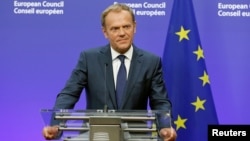It will be harder to keep the West united toward Russia with Donald Trump as United States president than it has been with Barack Obama, European Council President Donald Tusk said in comments published on Thursday.
Trump's election promise to improve Washington's chilly relations with Russia's President Vladimir Putin have caused jitters within the EU, particularly in eastern member states like Poland and the Baltics.
Putin seemed to respond to Trump in his annual state of the nation address on Thursday, saying Moscow wanted to get along with the incoming U.S. administration and was looking to make friends not enemies.
"Keeping European unity towards Russia in the conflict with Ukraine, and more broadly also in global issues, was possible also thanks to the large support from President Obama," Tusk told Polish TVN24 broadcaster.
"Today, I think that after the election and the victory of Donald Trump, it will be harder to build such unequivocal and uniform policy of the whole western world towards Russia. But one cannot give in," he said.
Tusk, a former Polish prime minister, also said that many public statements from Trump have reflected a different attitude towards Europe, NATO and Russia from his predecessors.
The EU Council president said in his first conversation with Trump, he tried to get the president-elect interested most of all in the situation of Ukraine, but Trump was more focused on Britain's planned exit from the EU.
"I would say the conversation was rather general in nature," Tusk said. "It was longer than I expected but Trump's attention focused rather on Brexit that on eastern issues."
In his election campaign, Trump also asked whether the United States should protect allies seen as spending too little on their defense. That raised fears that he could withdraw funding for NATO at a time of heightened tensions with Russia.
Asked whether he would support inviting Russia back to talks with the Group of Seven (G7) club of major industrialized nations, Tusk responded in the negative.
"There are reasons for which the western world ... has decided in favor of such a tough stance versus Russia and none of these reasons have disappeared," he said.
The United States and the European Union imposed economic sanctions on Russia following its 2014 annexation of Ukraine's Crimea peninsula. Russia's support for separatists in Ukraine led the G7 to suspend their invitation to Moscow to join their talks.





